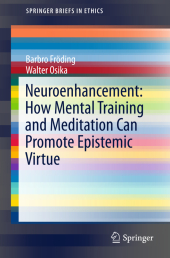 Neuerscheinungen 2015Stand: 2020-02-01 |
Schnellsuche
ISBN/Stichwort/Autor
|
Herderstraße 10
10625 Berlin
Tel.: 030 315 714 16
Fax 030 315 714 14
info@buchspektrum.de |

Barbro Fröding, Walter Osika
(Beteiligte)
Neuroenhancement: how mental training and meditation can promote epistemic virtue
The Positive Effects of Mediation on the Brain
1st ed. 2015. 2015. xi, 110 S. 235 mm
Verlag/Jahr: SPRINGER, BERLIN; SPRINGER INTERNATIONAL PUBLISHING 2015
ISBN: 3-319-23516-8 (3319235168)
Neue ISBN: 978-3-319-23516-5 (9783319235165)
Preis und Lieferzeit: Bitte klicken
This book explores how one can bring about changes in the brain through meditation, both through attention-focus training and through compassion training. Recent findings in the natural sciences have confirmed that it is possible for humans to achieve these structural and functional changes through various life-style practices. It is argued that meditation enables us to influence some aspects of our biological make-up and, for example, could boost our cognitive flexibility as well as our ability to act compassionate. Such changes are likely to facilitate the instilling of a number of epistemic virtues which have great bearing on our quality of life. This book offers the reader an accessible introduction to a set of neuro-enhancement methods, with a special focus on meditation techniques, and explores how such practices could contribute to make us better decision-makers and improve our moral virtues. The book is suitable for anyone looking for a text discussing the effects of neuro-enhancement from a secular ethics perspective.
CHAPTER 1 - Introduction.- 1.1 Introduction .- 1.2 A new situation.- 1.3 From bad to worse .- 1.4 How to handle matters better: skills required to manage risks.- 1.5 Can we acquire the skills?.- 1.6 Enhancement methods.- 1.7 Which cognitive capacities?.- References.- CHAPTER 2 - The neurophysiological background .- 2.1 Introduction.- 2.2 Neuroplasticity.- 2.3 Attention.- 2.4 Mind-wandering .- 2.5 Emotional regulation.- 2.6 Mental training -meditation.- 2.7 Some challenges with meditation practice and research .- References.- CHAPTER 3 - The Methods .- 3.1 How to improve.- 3.2 Defining cognitive enhancement.- 3.3 Three methods .- 3.4 Pharmaceuticals, hormones and neurotransmitters.- 3.5 Technology.- 3.6 Possible effects of meditation techniques and mental training.- 3.7 Computer games.- Combining methods.- References.- CHAPTER 4 - Cognitive flexibility.- 4.1 How does cognitive flexibility relate to meditation?.- 4.2 Cognitive flexibility
4.3 Why is it good to be more cognitively flexible? .- 4.4 Improved cognitive flexibility can translate to better decision-making.- 4.5 Smarter but not nicer.- 4.6. Summary.- References.- CHAPTER 5 -Some key elements of virtue ethics.- Part A: A brief introduction to virtue ethics .- 5.1. Introduction.- 5.2 A suitable moral framework.- 5.3 The beginnings of virtue ethics.- 5.4 What is the virtuous life and
what is so good about it?.- 5.5 In summary.- Part B: From meditation to the good life.- 5.6 Training for virtue.- 5.7 Creating moral experts.- 5.8 Enhancement as an enabler .- 5.9 Enhancement as a way to increase commitment .- 5.10 Helpful but not enough .- 5.11 The role of epistemic virtues.- 5.12 Some modern or new epistemic virtues that might be useful.- 5.12 From core capacities to functional change and decision-making .- 5.13 Commonalities and compatibility .- 5.14 Conclusion.- References.- CHAPTER 6 - Conclusions.- 6.1 Summary.- 6.2 Combinations.- 6.3 Moral enhancement - different takes.- 6.4 The role of embedding structures .- 6.5 Concluding remarks.- References.


